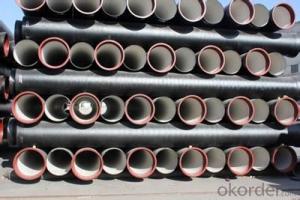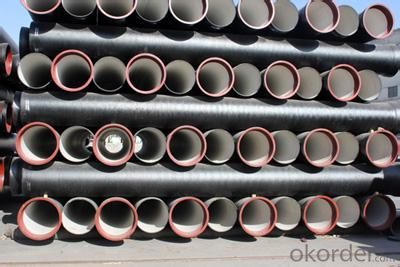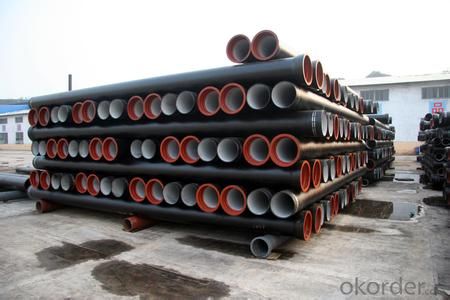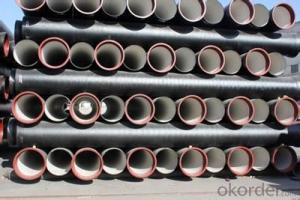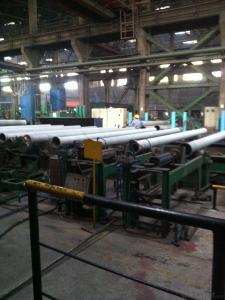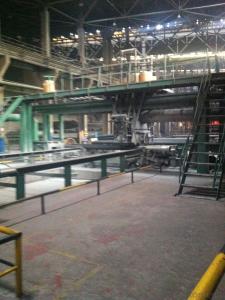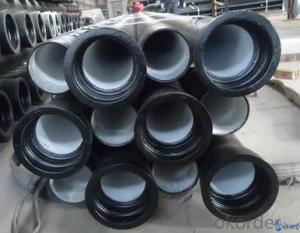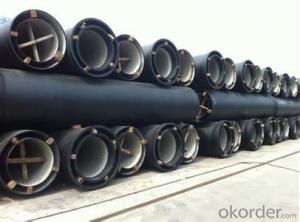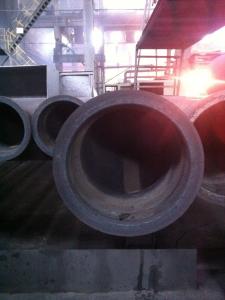DUCTILE IRON PIPES AND PIPE FITTINGS K9 CLASS DN80
- Loading Port:
- Tianjin
- Payment Terms:
- TT OR LC
- Min Order Qty:
- 22 pc
- Supply Capability:
- 3000 pc/month
OKorder Service Pledge
OKorder Financial Service
You Might Also Like
Material : Ductile Cast Iron
Size Range : DN 80mm to DN 2000mm
Unit Effective Length : 6m or 5.7m
Manufacture Standard: ISO 2531:1998/ EN 545:2006/EN 598:2007
Annual capacity : 200,000 tons
Coating Exterior: Zinc 130g/m2 according to ISO 8179-1 and bitumen coating 70 microns.
Cement Interior: Portland Cement/ High Alumina Cement/ Sulphate Resisting Cement Lining according to ISO 4179
Special requirements on external coating and internal lining can be applied
We also provide accessories such as SBR/EPDM rubber gaskets, lubricant paste, pipe caps, PE sleeves, etc.
Additional Parts:
Each pipe is strictly inspected according to related standard to ensure permanently high performance.
Easy Installation at site and service free for life
Long Service Lifespan
Quotation will arrive you within 24hours once we get your inquiry.
We guarantee offering you a competitive price.
A copy of original inspection reports of pipes will be offered after shipment.
Photos of loading process will be sent to the customer after shipment effect.
We will follow-up the delivery progress after shipment effect and update to the customer on weekly basis.
- Q: Can ductile iron pipes be used in high-pressure applications?
- Yes, ductile iron pipes can be used in high-pressure applications. Ductile iron pipes are known for their strength and durability, making them suitable for handling high-pressure fluids or gases. They have a higher pressure rating compared to other types of pipes, such as PVC or HDPE pipes. Ductile iron pipes also have excellent resistance to external loads and are capable of withstanding high internal pressures. These pipes are commonly used in water and wastewater systems, as well as in industrial applications where high-pressure conditions are present. It is important, however, to ensure that the ductile iron pipes used in high-pressure applications meet the required standards and specifications to ensure their safe and reliable operation.
- Q: Can ductile iron pipes be used for geothermal systems?
- Yes, ductile iron pipes can be used for geothermal systems. Ductile iron is known for its strength, durability, and corrosion resistance, making it suitable for various applications including geothermal systems. These pipes can handle high temperatures and pressure fluctuations commonly found in geothermal systems. Additionally, ductile iron pipes have excellent thermal conductivity properties, allowing for efficient heat transfer between the geothermal fluid and the surrounding environment. Therefore, ductile iron pipes are a viable option for transporting geothermal fluids in geothermal systems.
- Q: How does ductile iron pipe perform in areas with high soil movement?
- Ductile iron pipe performs well in areas with high soil movement due to its inherent flexibility and strength. Its ability to withstand soil settlement, ground shifting, and seismic activity makes it a reliable choice for underground pipelines. The pipe's ductility allows it to sustain deformation without fracturing, ensuring continued functionality even in challenging soil conditions. Consequently, ductile iron pipe is an ideal solution for areas prone to soil movement, providing long-lasting and durable performance.
- Q: How do ductile iron pipes handle internal scale buildup?
- Ductile iron pipes possess exceptional resistance to the accumulation of internal scale, making them highly regarded. The material utilized in these pipes displays remarkable resistance to corrosion, effectively hindering the formation of scale deposits. Moreover, the pipes' sleek internal surface considerably reduces the likelihood of scale adherence. In the unlikely event that scale does commence its formation, ductile iron pipes handle it proficiently. The inherent robustness and durability of ductile iron enable it to withstand the pressure exerted by scale buildup. Consequently, the pipes can maintain efficient functionality, even in the presence of some internal scaling, thereby ensuring a dependable water flow. Nevertheless, it should be emphasized that regular maintenance and periodic cleaning remain imperative in order to prevent excessive accumulation of scale and ensure optimal pipe performance. This can be achieved through a variety of methods, including mechanical cleaning, chemical treatments, or high-pressure water jetting. By adhering to proper maintenance practices, the lifespan of ductile iron pipes can be prolonged, while minimizing any potential issues associated with internal scale buildup.
- Q: How does ductile iron pipe perform in sandy or unstable soils?
- Due to its inherent strength and flexibility, ductile iron pipe exhibits exceptional performance in sandy or unstable soils. Its composition, which includes a combination of iron, carbon, and small amounts of other elements, grants it superior mechanical properties compared to other pipe types. In sandy soils, where the ground may shift and cause pipe movement and deformation, ductile iron's high tensile strength and elongation characteristics enable it to withstand pressure and stress without fracturing or breaking. Its flexibility allows it to accommodate soil movement and settlement, reducing the risk of pipe failure. Furthermore, ductile iron pipe's resistance to corrosion makes it highly suitable for installation in sandy soils. The application of protective linings and coatings on both the interior and exterior of the pipe prevents corrosive elements in the soil from attacking the iron, ensuring durability and reliability in the long term. In unstable soils with varying compaction levels or weak load-bearing capacity, ductile iron pipe's sturdy construction provides stability and support. Its robustness allows for even distribution of loads, minimizing the chances of pipe deflection or collapse. Moreover, the joint design and sealing methods of ductile iron pipe, such as push-on joints or mechanical joints with rubber gaskets, offer excellent leak resistance and prevent soil infiltration. This further enhances its performance in sandy or unstable soils. Overall, the combination of strength, flexibility, corrosion resistance, and reliable joint systems makes ductile iron pipe an ideal choice for applications in sandy or unstable soils. It provides a long-lasting and efficient solution for the transmission of water and wastewater.
- Q: What are the typical joint sealing requirements for ductile iron pipes under pressure?
- The typical joint sealing requirements for ductile iron pipes under pressure include the use of rubber gaskets and mechanical joints. These joints are designed to provide a watertight seal and prevent any leakage or seepage of the pressurized fluid. Additionally, proper cleaning and lubrication of the joints before assembly is crucial to ensure a secure and effective seal. Regular inspection and maintenance are also necessary to identify and address any potential joint sealing issues.
- Q: Can ductile iron pipe be used for hydropower systems?
- Yes, ductile iron pipe can be used for hydropower systems. Ductile iron pipe is known for its strength, durability, and corrosion resistance, which makes it an ideal choice for various applications, including hydropower systems. The high tensile strength of ductile iron allows it to withstand the high pressure and load requirements of such systems. Additionally, its corrosion resistance properties make it suitable for use in water environments, ensuring a long lifespan and minimal maintenance needs. Therefore, ductile iron pipe can be effectively utilized for hydropower systems, providing a reliable and efficient solution for transporting water and supporting the infrastructure of the system.
- Q: What are the different sizes available for ductile iron pipe?
- Ductile iron pipes come in a wide variety of sizes to meet the needs of different applications in the water and wastewater industry. These pipes typically range in diameter from 3 inches to 64 inches. The most commonly used sizes are 4 inches, 6 inches, 8 inches, 10 inches, 12 inches, 16 inches, 20 inches, 24 inches, 30 inches, and 36 inches. However, larger sizes can also be manufactured for specific project requirements. Having different sizes available allows for flexibility in designing and constructing water distribution systems, sewage networks, and other infrastructure projects. The choice of the appropriate size depends on factors like the volume of flow, pressure requirements, and the distance the pipe needs to cover. It's important to note that the size of a ductile iron pipe refers to its internal diameter, which is also known as the nominal bore. The actual outside diameter of the pipe may vary slightly depending on the manufacturer and the specific dimensions provided. When selecting a size for ductile iron pipes, it's crucial to consider factors such as hydraulic capacity, installation requirements, and compatibility with other pipeline components. Seeking advice from engineers and industry experts is recommended to ensure the correct size is chosen for each particular application.
- Q: Can ductile iron pipe be used for cooling water systems?
- Yes, ductile iron pipe can be used for cooling water systems. Ductile iron pipe has excellent corrosion resistance, high tensile strength, and is capable of withstanding high-pressure conditions, making it suitable for various applications, including cooling water systems. Its durable and versatile nature allows it to effectively transport and distribute cooling water without the risk of leakage or failure. Additionally, ductile iron pipe is known for its long service life and low maintenance requirements, making it a cost-effective choice for cooling water systems.
- Q: What is the process of fusion bonding for ductile iron pipes?
- Fusion bonding for ductile iron pipes is a process that involves heating the pipes to a specific temperature and then applying pressure to fuse the ends of two pipes together. This creates a strong and durable bond between the pipes, ensuring a leak-proof connection. The fusion bonding process is commonly used in the construction and maintenance of underground water and sewer systems.
Send your message to us
DUCTILE IRON PIPES AND PIPE FITTINGS K9 CLASS DN80
- Loading Port:
- Tianjin
- Payment Terms:
- TT OR LC
- Min Order Qty:
- 22 pc
- Supply Capability:
- 3000 pc/month
OKorder Service Pledge
OKorder Financial Service
Similar products
Hot products
Hot Searches
Related keywords
